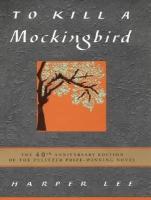
Title: To Kill a Mockingbird
Author: Harper Lee
Genre: Southern Gothic Fiction
Summary:
Over the years, To Kill a Mockingbird has become a must read for high schoolers at some point.
Set in the fiction town of Maycomb, Alabama during the Great Depression. Jean Louise Finch,
or “Scout,” is a young girl coming of age during a time of extreme prejudice and racism during
the late 1920s. Scout and her brother Jem are raised by their widowed father, Atticus Finch,
taking on a controversial court case regarding the accused raping of Mayella Ewell by Tom
Robinson, a black man. The entire storyline slowly builds up to the court case and stands as the
climax of the story. Up to that point, the novel focuses on the adventures and situations that
Scout, Jem, Atticus, and their neighbors experience during the three year time period in which
the book is set. Throughout these situations, Scout learns about the racial prejudices of her time
as well as how the black community felt about the time period, and specifically the court case.
Today, To Kill a Mockingbird remains as one of the most popular American novels in history.
Opinion:
To Kill a Mockingbird is one of the few books where my attention never dropped once; each
chapter felt like a new lesson to be learned related to the time period and is precisely what makes
it such a compelling read. The only gripe I have about it isn’t even the book’s fault: the times
today have simply changed and some of the lessons learned in the book don’t quite apply to
today’s society. Nonetheless, Harper Lee truly outdid herself with the story as well: a gripping,
heart-wrenching tale about a part of America that is often overlooked. I would personally
recommend this book for those in ninth grade and above as it does contain explicit language and
deep content which younger students may not be mature enough to handle.
Cover:
No need for anything complex! The cover is just what it needs to be, an artistic representation of
what the analogy of the book is based on.
Rating:
I rate To Kill a Mockingbird a five because of its historical significance and coming-of-age
lessons to be learned from it, even if it doesn’t mean quite as much today as it did back then.
